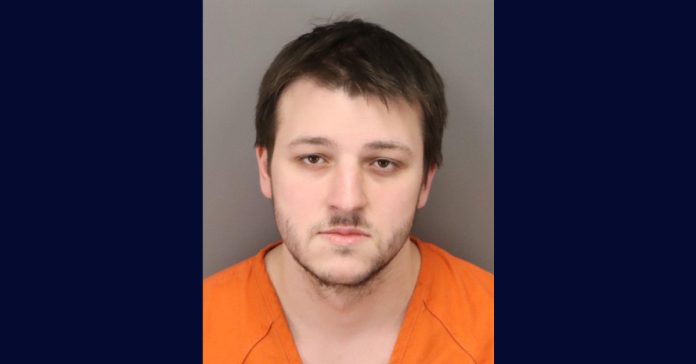
Jail inmate Alexander Leszczynski tried have two fraud victims killed, prosecutors said. (Mug shot: Pinellas County Sheriff’s Office)
A man who faked a pardon from former President Donald Trump received the second half of his punishment for part of a wide-ranging and nearly bloody series of schemes.
Alexander Leszczynski, 25, was sentenced on Wednesday to 17 years and six months in federal prison for plotting to have two of his fraud victims murdered. He must serve this consecutively, meaning one after the other, to the punishment he received last month in a related fraud case: 17 years and six months in federal prison.
According to documents and prosecutor press statements, Leszczynski used fake charities, including “Love & Bliss,” to fraudulently get about $195,910 in COVID-19 business relief funds. On top of that, he engaged in a check-kiting scheme to deposit $2.7 million of worthless checks into the Love & Bliss business account.
He laundered the ill-gotten money through multiple accounts in order to hide it from authorities. It didn’t work. On Jan. 11, 2022, Leszczynski wired $337,000 in an attempt to buy gold, but the U.S. government seized the funds.
“After Leszczynski became aware of the seizure, he attempted to have GoldSilver.com release the funds by providing them with a forged Presidential Pardon purportedly signed by President Donald J. Trump,” prosecutors wrote.
Trump hadn’t been president for about a year at this point.
As for the murder-for-hire plot, that stems from a scheme in which he filed for a fraudulent warranty deed to grant himself and his businesses 10 properties nationwide. One of those was a residence in Redington Shores, Florida.
The homeowners sued to correct the deed. Leszczynski answered by harassing them and their attorneys through letters, emails, and faxes, prosecutors said.
Finally, he was charged on April 22 in connection to the deed fraud and other crimes. While locked up in Pinellas County Jail, he tried to find someone to kill the homeowners.
He claimed to have $45,000 hidden at home for the purpose of hiring a killer, prosecutors said.
His reasoning: Prosecutors would have to drop their charges if the victims died, and he could get the property for himself.
A confidential informant agreed to put him in contact with a hitman. Instead, it was an undercover agent.
Speaking with the “hitman” over the phone, Leszczynski shared the victims’ names, address, physical descriptions, approximate ages, and other details to help the “hitman” find their pictures online.
They negotiated a price at $30,000, with the cover story that this was college tuition money. He repeatedly maintained he wanted the homeowners dead.
Have a tip we should know? [email protected]

